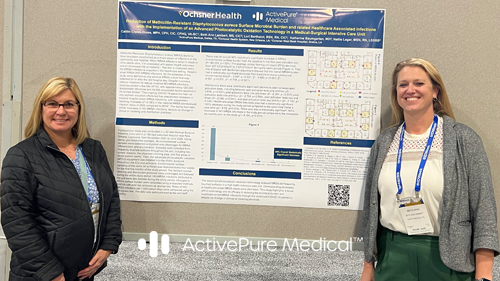Powerful Protection
Against The Spread Of
Healthcare-Associated Infections (HAIs)

New study results show total elimination of HO-MRSA and 98% decrease of MRSA surface burden during trial period
ActivePure Healthcare is pleased to announce the publication of Reduction of Methicillin-Resistant Staphylococcus aureus Surface Microbial Burden and related Healthcare Associated Infections with the implementation of an Advanced Photocatalytic Oxidation Technology in a Medical-Surgical Intensive Care Unit. This study highlights the efficacy of ActivePure’s novel advanced photocatalytic oxidation (aPCO) technology at reducing microbial burden and healthcare-onset Methicillin-Resistant Staphylococcus aureus (HO-MRSA) infections in a medical-surgical intensive care unit (ICU) despite no change in clinical practice.
The last few years have exposed the risks of infection by spotlighting the issues that already existed, raising their visibility, but also the 21st century solutions that are now available. The results of this study have opened the door for healthcare facilities to protect their areas prone to the spread of healthcare-associated infections, like MRSA, with proven, real-world results.
— Deborah Birx, MDChief Medical and Science Advisor, ActivePure Technologies
MRSA
Methicillin-resistant Staphylococcus aureus (MRSA) is type of the Staphylococcus aureus (staph) bacterium that is resistant to several antibiotics,1 including methicillin, that are commonly used to treat ordinary staph infections.2 In healthcare settings—such as U.S. hospitals, where approximately 5% of patients carry MRSA bacteria in their nose or on their skin—MRSA can cause bloodstream infections, pneumonia, or surgical site infections.3
HO-MRSA
Between 2020 and 2021, a statistically significant 14% increase in healthcare-associated infections (HAIs) attributed to MRSA were reported among national acute-care hospitals.4 The COVID-19 pandemic had not only stymied reduction efforts but also precipitated a rise in invasive healthcare-onset MRSA (HO-MRSA) infections, with increases seen of 12-34% in national MRSA standardized infection ratios in 2020 compared to 2019.
The Study
A medical-surgical intensive care unit (ICU) at a suburban hospital had seen similar increases in HO-MRSA infections—defined as a positive culture on or after the 3rd hospital day—despite no change in clinical practice. Between 2021 and 2022, a prospective study of ActivePure’s advanced photocatalytic oxidation (aPCO) technology was conducted at the high-acuity facility, including baseline and regular post-activation surface samplings. No changes were made or required to the hospital’s cleaning and disinfection practices, trainings, or schedules during this time.
Results
- Statistically significant 98% decrease in MRSA surface burden from baseline to final post-activation test
- Statistically significant decrease in HO-MRSA infections—including total elimination during the trial period—when compared to the same timeframe a year prior and the immediate 6 months prior to the study
- 99% decrease in average MRSA surface colony-forming-unit (CFU) counts from baseline to final post-activation test (427 to 3 CFU/100cm2)

Conclusion
ActivePure’s novel aPCO technology resulted in a reduction of microbial burden and HAIs despite no change in clinical practice. The technology reduced MRSA on frequently touched surfaces in a high-traffic ICU, with corresponding decreases in HO-MRSA cases also seen.
ActivePure Healthcare Case Study
At ActivePure Healthcare, we believe in taking a bundled approach to reduce healthcare-associated infections. But we cannot do it alone. We rely on healthcare partners, like our study hospital, who will not stop until they achieve zero. Please provide your email to download the study abstract PDF.
Meet the Authors
IDWeek 2022 Photos
Are You Ready to Take the Next Step in
Infection Prevention?
1 Mayo Clinic. MRSA infection. https://www.mayoclinic.org/diseases-conditions/mrsa/symptoms-causes/syc-20375336
2 Centers for Disease Control and Prevention. (2019, February 5). Methicillin-resistant Staphylococcus aureus (MRSA). https://www.cdc.gov/mrsa/index.html
3 Centers for Disease Control and Prevention. (2019, June 26). Methicillin-resistant Staphylococcus aureus (MRSA): General Information. https://www.cdc.gov/mrsa/community/index.html
4 Centers for Disease Control and Prevention. (2022, November 3). Healthcare-Associated Infections (HAIs): Data Portal. https://www.cdc.gov/hai/data/portal/index.html





